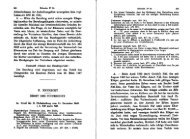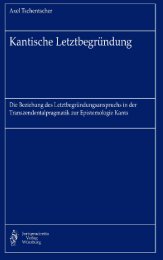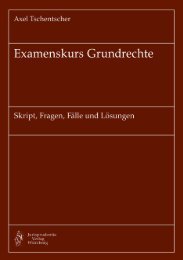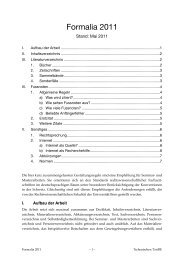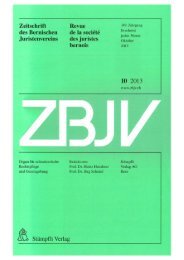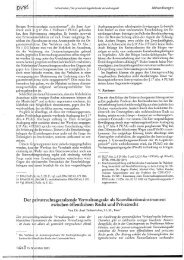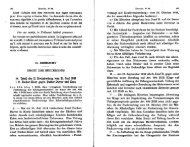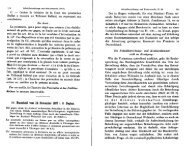Prozedurale Theorien der Gerechtigkeit - servat.unibe.ch
Prozedurale Theorien der Gerechtigkeit - servat.unibe.ch
Prozedurale Theorien der Gerechtigkeit - servat.unibe.ch
Sie wollen auch ein ePaper? Erhöhen Sie die Reichweite Ihrer Titel.
YUMPU macht aus Druck-PDFs automatisch weboptimierte ePaper, die Google liebt.
ten Gemeins<strong>ch</strong>aftsverständnissen einer 'instrumental community' und einer 'sentimental<br />
community' eine dritte gegenüber. Diese 'constitutive community' zei<strong>ch</strong>ne<br />
si<strong>ch</strong> dadur<strong>ch</strong> aus, daß Mens<strong>ch</strong>en ihr ni<strong>ch</strong>t nur mehr o<strong>der</strong> weniger freiwillig angehören,<br />
son<strong>der</strong>n daß sie erst dur<strong>ch</strong> die vorgefundene Gemeins<strong>ch</strong>aftszugehörigkeit erkennen,<br />
wer sie selbst sind 122 . Es sei ihnen ni<strong>ch</strong>t mögli<strong>ch</strong>, si<strong>ch</strong> selbst unabhängig von<br />
ihrer Gemeins<strong>ch</strong>aftsbindung wahrzunehmen, wie dies in je<strong>der</strong> liberalen <strong>Gere<strong>ch</strong>tigkeit</strong>sbegründung<br />
vorausgesetzt werde 123 . We<strong>der</strong> sei <strong>der</strong> einzelne frei, si<strong>ch</strong> seine Konzeption<br />
des Guten ganz unabhängig von an<strong>der</strong>en zu su<strong>ch</strong>en, no<strong>ch</strong> könne den an<strong>der</strong>en<br />
eine völlige Wahlfreiheit für ihre Ziele und Lebenspläne zugestanden werden,<br />
ohne damit glei<strong>ch</strong>zeitig die Identität jedes Gemeins<strong>ch</strong>aftsmitglieds zu beeinflussen<br />
und zu gefährden 124 . Das individualistis<strong>ch</strong>e Mens<strong>ch</strong>enbild stellt si<strong>ch</strong> vor diesem<br />
Hintergrund ni<strong>ch</strong>t als Befreiung dar, son<strong>der</strong>n raubt dem einzelnen seinen Charakter<br />
und liefert ihn <strong>der</strong> Willkür unbegrenzter Wahlfreiheit des moralis<strong>ch</strong>en Handelns<br />
aus 125 : Freunds<strong>ch</strong>aft, Güte und Liebe werden zu bloßen Instrumenten einer egozentris<strong>ch</strong>en<br />
Wahl umgedeutet und dadur<strong>ch</strong> entstellt 126 .<br />
Da si<strong>ch</strong> Sandels Kommunitarismus bewußt auf die Kritik am Liberalismus konzentriert<br />
127 , ist es ni<strong>ch</strong>t ganz einfa<strong>ch</strong>, daraus auf die konkrete <strong>Gere<strong>ch</strong>tigkeit</strong>skonzeption<br />
zu s<strong>ch</strong>ließen, zu <strong>der</strong> seine Form des Kommunitarismus führen müßte. Wi<strong>ch</strong>tig<br />
ist zunä<strong>ch</strong>st, daß Sandel bei aller Liberalismuskritik ni<strong>ch</strong>t insgesamt antiliberal eingestellt<br />
ist, son<strong>der</strong>n den Liberalismus vielmehr als Projekt <strong>der</strong> Befreiung würdigt 128 .<br />
Was im Ergebnis an<strong>der</strong>s ist, wenn man die liberalismusgeprägte Re<strong>ch</strong>ts- und Sozialordnung<br />
dur<strong>ch</strong> eine neue Gemeins<strong>ch</strong>aftsbezogenheit uminterpretiert, indem man<br />
Universalismus dur<strong>ch</strong> Kontextualismus ersetzt, wird bei Sandel, soweit ersi<strong>ch</strong>tli<strong>ch</strong>,<br />
ni<strong>ch</strong>t ausdrückli<strong>ch</strong> dargelegt. Ein konkreter Unters<strong>ch</strong>ied könnte darin liegen, daß es<br />
aus kommunitaristis<strong>ch</strong>er Si<strong>ch</strong>t beispielsweise zulässig ist, in einer Stadt pornographis<strong>ch</strong>e<br />
Bu<strong>ch</strong>läden allein deshalb zu verbieten, weil sie gegen die Lebensweise und<br />
122 Die S<strong>ch</strong>lüsselstelle findet si<strong>ch</strong> bei M. Sandel, Liberalism and the Limits of Justice (1982), S. 150: »A<br />
theory of community whose province extended to the subject as well as the object of motivations<br />
would be individualistic in neither the conventional sense nor in Rawls'. It would ... differ from<br />
Rawls' conception in that community would describe not just a feeling but a mode of selfun<strong>der</strong>standing<br />
partly constitutive of the agent's identity. On this strong view, to say that the<br />
members of a society are bound by a sense of community is not simply to say that a great many of<br />
them profess communitarian sentiments and pursue communitarian aims, but rather that they<br />
conceive their identity – the subject and not just the object of their feelings and aspirations – as defined<br />
to some extent by the community of whi<strong>ch</strong> they are a part. For them, community describes<br />
not just what they have as fellow citizens but also what they are, not a relationship they <strong>ch</strong>oose (as<br />
in a voluntary association) but an atta<strong>ch</strong>ment they discover, not merely an attribute but a constituent<br />
of their identity. In contrast to the instrumental and sentimental conceptions of community,<br />
we might describe this strong view as the constitutive conception.« Die S<strong>ch</strong>lüsselstelle findet si<strong>ch</strong><br />
nahezu wortglei<strong>ch</strong> wie<strong>der</strong>holt au<strong>ch</strong> auf S. 173.<br />
123 M. Sandel, Liberalism and the Limits of Justice (1982), S. 179.<br />
124 Vgl. M. Sandel, Liberalism and the Limits of Justice (1982), S. 179.<br />
125 M. Sandel, Liberalism and the Limits of Justice (1982), S. 177 ff. (179 f.).<br />
126 Vgl. M. Sandel, Liberalism and the Limits of Justice (1982), S. 180 f.<br />
127 So heißt es am Anfang bei M. Sandel, Liberalism and the Limits of Justice (1982), S. 1.<br />
128 Beispielsweise M. Sandel, Liberalism and the Limits of Justice (1982), S. 175 ff.<br />
160


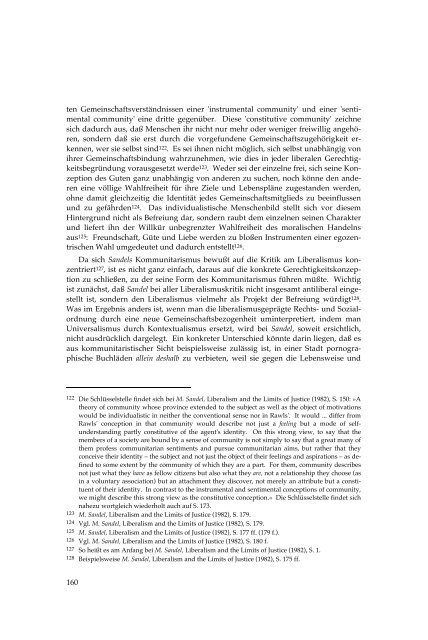
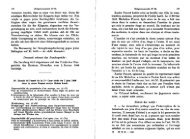
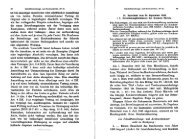
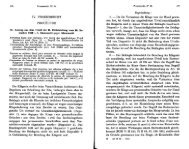
![Seminararbeit [Masterarbeit] - servat.unibe.ch - Universität Bern](https://img.yumpu.com/26241815/1/184x260/seminararbeit-masterarbeit-servatunibech-universitat-bern.jpg?quality=85)
